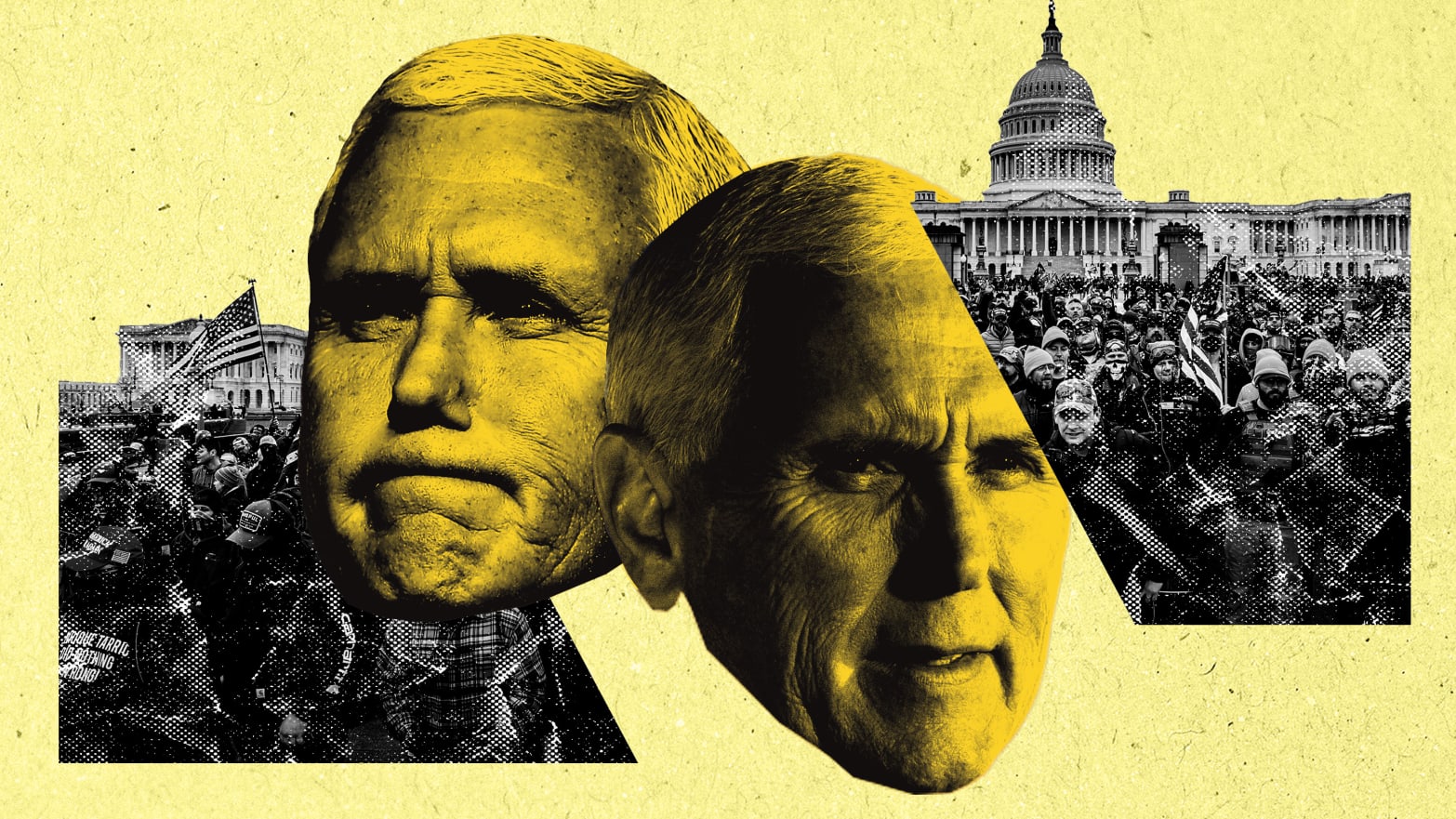Danger loomed on Jan. 6 for Mike Pence and his family, as the vice president stayed the course to fulfill what the Constitution required him to do in certifying the 2020 election.
Our democratic institutions held because Pence refused to go along with Trump’s pressure campaign, and for that he deserves to be called a “hero.” But now he’s putting Jan. 6 in the rearview mirror, calling it “a tragic day” that Democrats are using “to distract attention” from their failed policies.
Pence’s brief foray into heroism took real courage. He held steadfast as Trump-incited rioters stormed the Capitol, throughout a day that went into the wee hours, before Congress finally completed its work and certified Joe Biden as the next president. Pence, under siege, refused a Secret Service demand that he get into a car that would take him away from the Capitol. He knew if he left it would halt the certification process and prompt a constitutional crisis.
Pence deserves full credit for defying Trump and the mob chanting “Hang Pence.” But he also deserves condemnation for his ongoing efforts to appease Trump—and to perpetuate the nightmare he helped Trump create—signaling that he will not appear willingly before the Jan. 6 Committee, and calling the hearings “a distraction.”
“If I were advising the committee, I would ask Pence to appear voluntarily,” says Ned Foley, director of election law at Ohio State University. “You can’t understand Jan. 6 without understanding what everybody was up to, including Pence.”
Pence’s role must be seen in the context of the two months between Election Day and the Jan. 6 Capitol insurrection. “Pence undeniably deserves credit for essentially what he didn’t do despite the pressure he must have felt from Trump. You’ve got to give him credit for not bending under Trump’s pressure,” Foley told The Daily Beast.
But that’s not the whole story. There was more than a month between Nov. 7, when the three major television networks called the election for Joe Biden four days after Election Day, and the meeting of the Electoral College on Dec. 14. And then there were another three weeks before Jan. 6.
“History will have to judge how much Pence bears significant responsibility for this snowball that kept growing” between the Electoral College meeting in December, “a crucial pivot point” in the trajectory that led to the assault on the Capitol, says Foley.
The day after the electors met, then-Senate Majority Leader Mitch McConnell gave a speech on the floor of the Senate congratulating Biden and Harris on their election victory, ending his long silence after the November election. “I would have liked him to do it sooner,” says Foley. “But whatever you think of McConnell, he did the right thing after the electors met, and that signaled he would never go along with any scheme to overturn the election.”
That was Pence’s chance to come clean, to say the election was over, and to congratulate the incoming president and vice president. The Jan. 6 Committee will want to know why Pence stayed silent knowing what he knew or should have known. “Where I fault Pence is his behavior from Dec. 14 until Jan. 6,” says Foley. “You can’t rerun the tape, but I don’t think the crowd would have assembled to the degree it did, and Trump couldn’t have said, ‘It will be wild,’ if Pence had followed McConnell’s lead.”
Instead, on Jan. 4, Pence was in Georgia rallying a friendly crowd of evangelicals to vote Republican in two runoff elections that would determine which party controlled the Senate. “I share the concerns of millions of Americans about voting irregularities, and I promise you come this Wednesday, we’ll have our day in Congress,” Pence told these Georgia voters.
Trump voters, hearing the words, “our day in Congress,” had every reason to think Pence was going to act on their behalf and nullify the election results. “I’m inclined to credit Pence’s instinct, as his people have testified, that he didn’t think one person should have the power to change the election results,” says Foley, “But his January 4 speech went a long way to stoke the passions. He went right up to the line,” stopping just short of saying the election was stolen.
Pence’s ability to follow through hinged on what he knew about the senators and representatives who were ready and willing to repudiate the electoral vote. GOP Sens. Josh Hawley and Ted Cruz defied Leader McConnell in staging their objections to the electoral counts in Arizona and Pennsylvania. Hawley was photographed raising a fist in solidarity with the Jan. 6 crowd before making his way into the Capitol.
In Tuesday’s Jan. 6 Committee hearing, we learned Republican Sen. Ron Johnson’s chief of staff tried to set up a meeting with Pence on the morning of Jan. 6 where Johnson could give him the alternate slates of electors in Wisconsin and Michigan. Pence’s legislative aide refused the offer, and Johnson told reporters he didn’t know what was in the packet, and was merely the courier, which strains credulity.
Pence should have made it clear well before Jan. 6 that he would not be party to the scheme that we now know lawyer John Eastman and Rudy Giuliani and others were peddling. “That would have diffused to a considerable degree what happened on Jan. 6,” says Foley. Rather than wait “until 1 p.m. on Jan. 6 to follow the rules… it would have been a lot better if [Pence] had pulled the plug sooner.”
We think of the vice president as part of the executive branch, but his constitutional duty is to the Congress, where he serves as president of the Senate and chief legislative officer. He bridges the two branches, and for that reason alone, Pence owes it to the Jan. 6 Committee to come back and do a lot more explaining about what he was doing and thinking during that critical time that the Big Lie was snowballing into an assault on the Capitol.
President Gerald Ford willingly testified before Congress in October 1974 on the pardon he granted the disgraced former President Richard Nixon, explaining why it was justified and insisting there was no deal in place when he accepted the vice presidency. Tuesday’s hearing showed there are Republicans with the character and the stamina to stand up against Trump and his lies. Pence did it when it counted on that single day in January. Will he make the right choice on the many days ahead? Or will he retreat to the Big Lie cowardice that has consumed so much of his party?
As more information comes out in the hearings, it will be tempting for Pence to resist testifying and rest on his laurels as the hero of a day. That image can only be sullied with further details.

